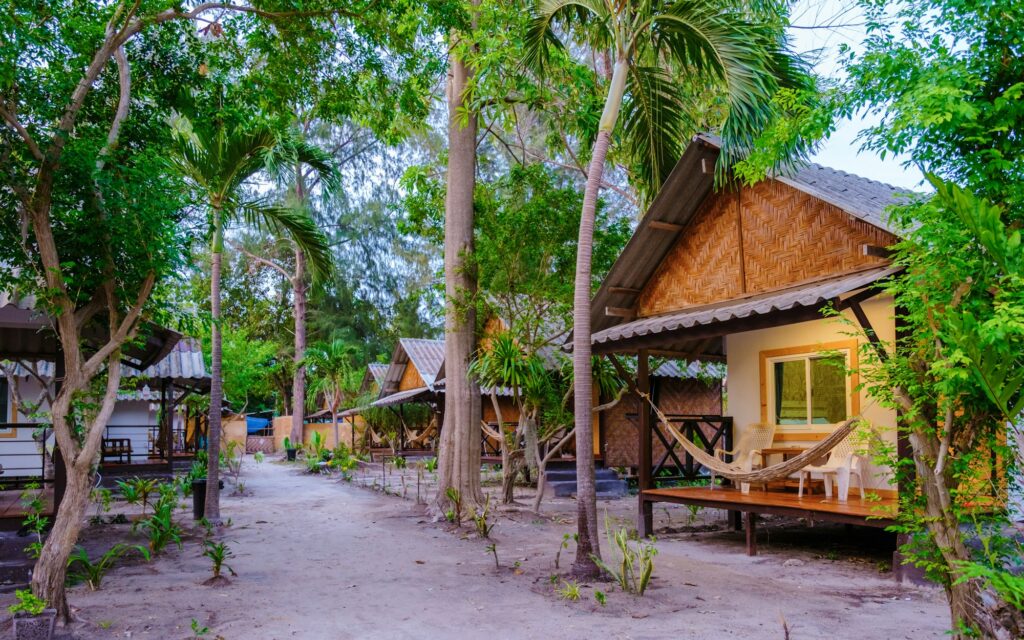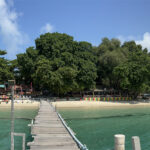Thailand, the vibrant heart of Southeast Asia, is the perfect introduction to backpacking around Asia. It has the perfect blend of culture shock and adventure, balanced with a friendly and accommodating population. Thailand is a well-trodden route for backpackers, so it is well-geared up for foreigners trying to find their way around. Follow our Travel guide to Thailand for our top advice.
Bangkok, Thailand’s pulsating capital, offers backpackers an exciting fusion of historical and contemporary attractions. Highlights include the mesmerising Grand Palace and the sacred Wat Phra Kaew, vibrant street markets like Chatuchak for unique finds, and the famed backpackers’ haunt, Khaosan Road, for night-time partying and street food.
Northwards, in Chiang Mai, immerse yourself in cultural experiences like traditional cooking classes and meditation retreats. Wander around the ancient temples of the Old City, or venture into the mountains for an awe-inspiring hike.
Down south in the Islands, Koh Phangan, renowned for its full moon parties, enthrals with its pristine waters for diving and snorkelling, and jungle trails leading to hidden waterfalls. In Krabi, beach and adventure lovers can kayak through mangrove forests, rock climb at Railay Beach, and dive into the vibrant marine life. Unforgettable experiences await with island hopping to Phi Phi Islands or Koh Lanta. Please take a look at our destination guides to find out more.

When is the best time to go to Thailand?
The best time to visit Thailand depends on your preferences. Seasonal temperatures might be important to you, so check out our Seasonal Weather in Thailand guide.
The high season for tourists, meaning busy destinations and higher prices, is usually November to March.
April is one of the hotter months and also the time for Songkran, the Thai New Year. This is a major Thai holiday, which means lots of celebrations, but also means locals book a lot of the transport. Also, it’s the most dangerous time to travel on the roads. March/April can also be a time for lots of pollution in the Northern regions such as Chiang Mai, where it is the burning season. If you have any breathing conditions you may well wish to avoid these areas at this time. Its also worth bearing in mind that the weather on the east coast for the Islands Koh Pha-ngan, Koh Samui, and Koh Tao have their rainy period over November and December. Again, check our Seasonal Weather in Thailand.
Don’t be put off by the rainy season either. The rain is often intense but short-lived and is quite refreshing to experience. Understandably the wetter months are usually quieter, but this is reflected by lower prices too.
Thailand Visa Requirements
Many countries are offered a visa waiver, where you can get 60 days on arrival without any paperwork. This is a recent development and has been extended to include 57 countries. However, as these things tend to change from time to time it’s best to check with the Thai visa website as well as with your own country’s Government travel advice. This has recently been put under review so I’d reccomend striongly to double check.
20,000 Baht Rule
You might have seen mention online about some tourists being denied entry to Thaailand because they did not have 20,000 baht (or equivalent currrency) in cash with them. This is actually a requirement for entry that is real, but not often checked. We have a dedicated article on this here “Do I really need 20k baht cash?”
TDAC – Thailand Digital Arrival card
This is a new requirement on arrival from 1st May 2025. You can fill it in before you arrive on the website tdac.immigration.go.th or you can use a terminal on arrival. This is valid for 90 days and must be re-filled if staying longer than 90 days, This asks for your personal details and details about your trip, plus a health declaration.
Money
The currency in Thailand is the Thai Baht. There are plenty of ATM’s around but they usually have a charge of 200 Baht per transaction, so try and take out a reasonable amount each time to save on costs. Debit and credit cards are not taken often except in major shops like 7-11. See our guide to budgeting with our Thailand travel budget calculator.
Health & Safety in Thailand
Travelling in Thailand is a safe and trouble-free experience for the majority of visitors. However, it is wise to be aware of a few factors that might be different to your home country.
The most important consideration is to make sure you have adequate travel insurance. Understandably, this is not an inspiring part of your adventure – but it should give you (and your mum) peace of mind. There are often stories of travellers who have neglected this aspect of their responsibility and have ended up in dire need of assistance without it. It is not worth the risk of going without. You should also be aware of common exceptions to claims such as being under the influence of alcohol and riding motorcycles without a licence or protective helmet.
Roads – Thailand has one of the world’s worst records for road safety. It is not recommended to hire a vehicle to drive unless you are experienced with it (especially bikes) and if you are used to the cultural driving norms – which are probably very different from home.
Food Safety – Stomach bugs abroad can be common, often just due to exposure to new germs you may not be used to. However, being proactive in basic hygiene such as hand washing can help prevent this. The best rule to stick to is to eat where it is busy. Don’t be afraid to eat at street vendors if you can see they are cooking things fresh and hot …
Scams – While violent crime is relatively low in Thailand, you are more likely to be scammed or robbed via stealth. Be aware of overly friendly people trying to give advice or a “special deal”. The rule applies especially in high tourist areas, which become a magnet for thieves and scam artists. It’s probably one of the worst detractors from visiting the country, maintaining a level of scepticism – whilst not letting it spoil your enjoyment of your trip. It gets easier with practice.

Accommodation in Thailand
One of the best things about staying in Thailand is the vast selection of accommodation priced to suit a wide range of budgets. Backpackers are well catered for, including hostels for those wishing to save money and make friends. Hotels in Thailand can be reasonably priced too, and don’t forget the idyllic beach huts on the southern islands. Look at our local travel guides to see plenty of accommodation and surrounding facilities.

Transport in Thailand
One of the great things about Thailand for backpackers is that it is easy to get around. It helps add to that sense of freedom and spontaneity. When travelling long distances, there are several airports, which is particularly helpful if you are short on time. These are mostly served by local airlines which can be cheap and cheerful. However, a network of trains and coaches also offers a more environmentally friendly option, with the bonus of scenery and adventure en route. Local transport links include Taxis and the world-famous Tuk-Tuk rickshaws. You will find plenty of tour agents willing to help you arrange transfers around the country, often selling combination tickets which combine a bus and a ferry ticket, common for Island transfers.
Flying – Airlines such as Air Asia, Nok Air, and Bangkok Airways operate at competitive prices depending on when you book. But note that Bangkok Airways has a monopoly on flying to Koh Samui, so expect their prices to be higher for comparable flights.
Buses – There is a huge array of buses, ranging from government-run busses to private budget buses to luxurious buses that let you lay flat out for a night’s sleep. If you are really (un)lucky you might get subjected to an extended period of Thai karaoke music.
Trains – Thailand has a good train network and is relatively cheap. Night trains are also a popular option, which saves you the cost of a hotel room. Popular routes, such as between Bangkok and Chiangmai, often need to be booked a month in advance because they sell out.
Boats – With all of the Islands in Thailand – you can expect to see a lot of ferry action. For shorter distances, you will find a lot of speedboats or long-tail boats willing to take you where you need to go, sometimes at negotiable prices. In Bangkok – river ferries are a very reasonably priced way to get across the city.
Local Transport – In major cities, you can now use smartphone apps such as Grab or Bolt. Otherwise, you can get meter taxis – which sometimes try to persuade you not to use the meter, for a fixed fee. This can sometimes work in your favour if you are knowledgeable about your journey, but it’s usually best to insist on a meter. Motorcycle taxis also exist, if you feel fearless or need to get somewhere in a rush.
Buses, especially in large cities, are cheap but very slow; they are quite an experience if you want to feel authentic.
The iconic, noisy, raucous Tuk-Tuk are usually more orientated towards tourists. This is reflected in higher prices than taxis. They are also more negotiable, as the initial quoted fare is usually grossly inflated. But they are fun and part of the experience of being in Thailand – so worth at least one trip. (Just don’t get drawn into the scam of getting dragged around the driver’s “friends” shops.)
A cross between a bus/taxi/tuk-tuk is the Songtaew. These are converted pickup trucks with bench seats. These are more commonly found in smaller cities with tourist centres and also on the islands. They often wait to have a few passengers before they set off – or they can go immediately if you are prepared to pay extra.
Motorbike rental – This can be a controversial subject. Bike hire is cheap and plentiful across Thailand and can be one of the most flexible forms of transport. However, this can come at a heavy cost. Thailand’s roads often take the unenviable title of most deadly worldwide. Roughly 20,000 deaths per year occur, mostly on motorbikes. Culturally speaking, as a foreigner, if you are involved in an accident, you can sometimes be held accountable, even if it wasn’t your fault.
If you are injured or liable for damage and need to claim in your insurance, most policies will not cover you if you are not licensed to drive a similar bike at home. Similarly, not if you are not wearing a suitable helmet or have consumed alcohol.
Even if you have a motorbike licence at home, you may find the rules (written and unwritten!) of the road completely different. Where you may expect people to adhere to the rules of the road at home, don’t be surprised to encounter people driving the wrong way down the road without lights at night and other ‘interesting’ behaviour.






